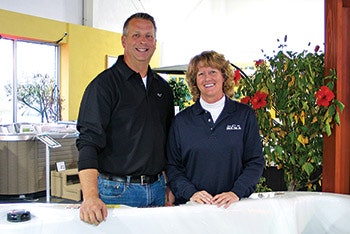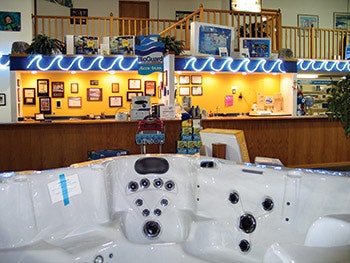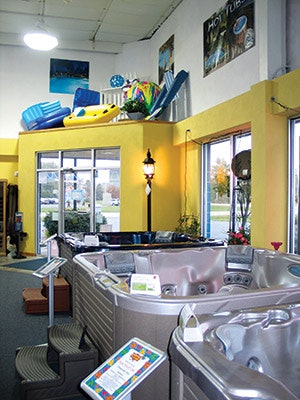
When approaching Wolter Pools and Spas from the North, coming down Highway 51 into Beloit, Wis., you might not expect to find a thriving pool and spa retailer. The country roads that lead to the store are surrounded by farms, the occasional small business and not a whole lot else. But when you pull into the parking lot and walk into the showroom, you’re greeted by an impressive, well-considered 6,000-square-foot retail space with walls of chemicals, a large hot tub bay, creative product displays and a friendly staff.
[AQUA Editor] Scott and I visited Wolter Pools and Spas to chat with owners Kim Wolter and Tom Larson, who shared with us the challenges they face and the strategies they’ve implemented to overcome them.
Testing the Waters
Beloit is a working class town a little less than two hours Northwest of Chicago. The area is not densely packed with potential customers; it’s more of a range, and Wolter’s trucks range as far as Madison to the North, Lake Geneva to the East and often cross into Northern Illinois to the South. The company’s location right off a major highway makes it possible for Tom and his team to cover their wide domain.
“We’re situated pretty good,” Larson says. “Beloit is right on the border, we’ve got highways going everywhere and they all meet right here.”
Also working to the company’s advantage is a long history of customer-centered service. For nearly 50 years and counting, Wolter Pools and Spas has been winning and keeping customers, one at a time, using the uncomplicated strategy of making sure they’re happy; this base of long-standing relationships is their stock in trade.
“There’s a lot of loyalty, which we’re grateful for,” Wolter says of the company’s customer base. “But to keep that loyalty, you have to continue putting out good service.”
One way Wolter and Larson accomplish that is by offering free water testing. Given the company’s convenient location, it’s a popular feature of the store, and for most customers, it helps build a mutually satisfying, interdependent bond.
However, it also makes Wolter and Larson vulnerable to a common problem with the practice: freeloaders.
“It’s a small percentage of our customers, but it’s frustrating on our end if week after week they come in and they never buy anything — it’s like they’re using you,” Wolter says.
“That’s our biggest thing,” Larson says. “People come in and we say, ‘It looks like you need this. Do you want me to get you some?’ ‘Oh no, I have plenty.’ Well, they don’t, because when I do the closings, I see what’s on the shelf.”
Larson says it’s a curious paradox: customers are willing to spend upwards of $50,000 on a new pool for their backyard, but still go to big box stores to save a few dollars on chemicals.
Over time, however, the duo developed a system. As a BioGuard dealer, Wolter Pools and Spas uses ALEX, the manufacturer’s water testing system. After analyzing each water sample, ALEX will print off a set of instructions about what exactly to add to the pool — or not.
“There’s a button in the program. If you hit ‘compact,’ it won’t print the whole paragraph about what to add or how long it’ll take. It’s not as in-depth,” Wolter says.
Customers who regularly come in for water tests and buy products will receive the full printout with prescriptive directions. Conversely, those who don’t make purchases get the abbreviated version. Wolter says this isn’t intended as a deliberate slight, but rather an opportunity to improve that customer relationship.
“You walk that fine line. You want to win the person over,” Wolter says. To do this, Wolter and her team gently breaks into a conversation about an issue and how her products or services can resolve that issue, not as a matter of making a sale, but as a matter of resolving the issue and potentially saving the customer in costly fixes and replacements later.
“We’ve been known for years for our water testing and the ability to help people,” she says. “For example, we’ve had people who have stains on their pool. They’re using a salt system and just putting plain salt in it, and now they’ve got iron stains all over everything. They come in to us, and we’re able to diagnose and walk them through the steps and fix it, when nobody else has been able to solve the problem.
“The better the system, the better the testing, the more answers we have as a company when people come in with problems, the more respect we get.”
However, this strategy comes with a caveat: you need the right people behind the counter to make it work.
“Somebody who’s just there putting the strip in the reader, pushing buttons, saying, ‘Here’s your sheet;’ they’re not going to engage in that kind of conversation,” she says.
Behind the Counter
The need for employees who can connect with customers and build relationships is a core concern for any retailer, and Wolter Pools and Spas has faced that hurdle for half a century. The hurdle has gotten a little higher in the modern era.
“Years ago, people were okay with working. They wanted the money and they worked for it. But now, lots of times, social things take precedence,” Wolter says. “I think parents want to make it easier on their kids, so they pay for things so the kids don’t have to work. So they think, ‘Why should I work when my mom and dad are going to give me the money to go to this event?’ It’s a different world today.”
Luckily, having roots in the community helps when the company is in need of help. Wolter and Larson have nieces and nephews who attend the local high school and spread the word among friends when the company is hiring. Tapping into the network of teachers for referrals also works.


“We’ll say, ‘Hey, we’re looking for somebody who’s personable and has good grades — can you send them in? We’re taking applications.’ Especially for store help, that’s worked out really well,” Wolter says.
Recently, the company struck gold at the school in the form of a teacher’s aide for seasonal help. “She worked out fantastic. She goes back to school right when things start slowing down, so that was perfect for us,” Wolter says. “She was looking for a little extra money and she has a pool, so she understood a lot of the chemistry and things that go with the pool, so that worked out really well.”
For the building/service side of the business, Wolter and Larson turn to the nearby technical college, which offers classes in construction, plumbing and other trades, for capable help.
Succeeding at Succession

One thing that has been easy for Wolter Pools and Spas: transition in ownership. Kim Wolter’s parents, Pat and Russ, opened the business in 1965. Kim and her two sisters helped out as kids, but the three eventually left to pursue other career interests. But at 24, Kim, who was working in manufacturing, was starting to consider rejoining the pool and spa business.
“Mom and Dad were saying, ‘You know, we’re thinking about getting out of this altogether.’ And I thought, ‘They have worked so hard to build this up; it’s an established business. A lot of people would give their right arm for that.’”
So Kim again joined her parents at Wolter. Her brother-in-law, Tom Larson, also came aboard — he previously worked at Wolter under Russ and later worked at Sta-Rite, giving him inside experience in pool equipment. Together, they bought the business from Pat and Russ seven years ago.
“So it’s second generation right now,” Larson says. “[Kim’s] mother still does a lot of the bookwork for us, and Russ, her father helps us — I’m always asking, ‘Remember when you built this pool 35 years ago?’ And he gives us a lot of insight.”
While they’re only seven years in, Larson and Wolter are already considering their own succession plan, perhaps to someone in the family or an employee.
“That’s something we have to get ready for,” Larson says. “That transition period — it’s 10, 12, 15 years down the road, but it’ll be here before you know it.”
Comments or thoughts on this article? Please e-mail [email protected].












































